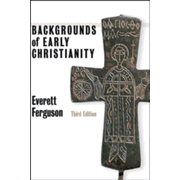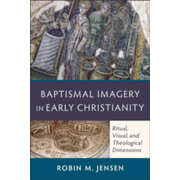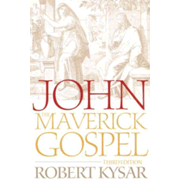
OUR TEXT of study for the Third
Sunday of Advent comes to us from the Gospel According to Saint John. In
keeping with the writer’s theme, John the Baptist came to the Jordan as a sign
of that great deed which God was doing among his people…
There
was a man sent from God, whose name was John. He came for testimony, to bear
witness to the light, that all might believe through him. He was not the light,
but came to bear witness to the light…
And this is the testimony of John, when the
Jews sent priests and Levites from Jerusalem to ask him, “Who are you?” He
confessed, he did not deny, but confessed, “I am not the Christ.” And they
asked him, “What then? Are you Elijah?” He said, “I am not.” “Are you the prophet?” And he answered, “No.”
They said to him then, “Who are you? Let us
have an answer for those who sent us. What do you say about yourself?” He said,
“I am the voice of one crying in the wilderness, ‘Make straight the way of the
Lord,’ as the prophet Isaiah said.”
Now they had been sent from the Pharisees.
They asked him, “Then why are you baptizing, if you are neither the Christ, nor
Elijah, nor the prophet?”
John answered them, “I baptize with water; but
among you stands one whom you do not know, even he who comes after me, the
thong of whose sandal I am not worthy to untie.” This took place in Bethany
beyond the Jordan, where John was baptizing.
(John 1:6-8, 19-28)
 |
Backgrounds of Early Christianity, Third Edition By Everett Ferguson |
Prophetic
Voice!
Likely spurred by the Holy Spirit during several decades of the first century, this gospel was in final form and opened with Jesus being introduced
as God’s eternal Word. In this first section, called the Prolog by
biblical scholars, John the Baptist emerged as a prophet.
This gospel leans heavily on “signs”, thus
enlisting the Baptist as our Lord’s first prophetic sign. We note that during the Prolog section of today’s
reading, in vss 6-8… the gospel speaks of light being present in two forms. Like a verb that
points to a noun in a language, John is described as a lamp bearing “witness”
(Greek – martyr). Jesus is thus named as the Light of the world. Therefore, our
author started this text using the language of the religious Gnostics, but as we read
later we find that the Gospel According to Saint John has a definite
anti-Gnostic bent.
You see, Gnostics spurned the flesh. They
believed that through mental knowledge, a person could work their way intellectually from
darkness into light, thus climbing the scholastic ladder toward becoming a mystical
purity… an “enlightened” one. However in John's gospel, instead of embracing this philosophy, the writer
directly fought against that thought-world by stating firmly that Jesus, being both
God and man… is the Light of the world. This knowledge comes to us as a gift,
however, and the awareness cannot be learned or earned.
 |
Baptismal Imagery in Early Christianity: Ritual, Visual, and Theological Dimensions - eBook By Robin M. Jensen |
Note that the witness of John the Baptist was
made specifically in the gospel before the priests and Levites who were sent from Jerusalem
by Pharisees. Those sent to Bethany to investigate the Baptist are portrayed by the
writer as persons who were jealously guarded in attitude. They were sent by the powers that
would stand over against the Baptist’s message, Therefore we may assume by
this tense, hostile portrait, that the author had already experienced the
separation of the early Church from the parental Jewish synagogue communities. That
the Baptist was described in the way of the ancient prophets speaking to a lost and wayward
people becomes evident. We are reminded by the Hebrew scriptures…
“Behold,
I send my messenger to prepare the way before me, and the Lord whom you seek
will suddenly come to his temple; the messenger of the covenant in whom you
delight, behold, he is coming, says the Lord
of hosts. But who can endure the day of his coming, and who can stand when he
appears?
“For
he is like a refiner’s fire and like fullers’ soap; he will sit
as a refiner and purifier of silver, and he will purify the sons of Levi and
refine them like gold and silver, till they present right offerings to the Lord.” (Malachi 1:1-3)
In his condemnation of the Levites therefore,
John the Baptist spoke also to those who were their powerful allies. In this
way, through this first century gospel writing, our Johannine author worked through the Spirit to condemn the synagogue leaders. Further in the gospel we find that our author repeatedly wrote
of these leaders collectively as “the Jews”, because they were unbelievers in Christ Jesus. However,
this is not to be taken by the reader as a call to hostility toward the whole of the Jewish
people. We are to avoid anti-Semitic persecutions which persist even
to this very day.
 |
John, the Maverick Gospel, Third Edition By Robert Kysar |
Remember! This gospel was addressed not just
to those persons who were present with John the Baptist at the water’s edge. I
offer to you that this message of our Lord's coming salvation can be found prominent in the early
Jewish and Gentile house churches… that the One who was to come according to the Baptist…was given the
title of “Christ” rather than the writer using the exclusive Hebrew term of
“Messiah”. This I believe was due to the makeup of the reading audience.
You see, by the time of writing the early Church was populated with baptized Christian Jews who were cast out from the synagogue… and also many baptized Gentiles who had been brought into the early church. Portrayed as doing that for which he was sent, therefore... John the Baptist told the gospel to those who immediately believed, and then this was restated for those who had yet to read the gospels. His witness thus claimed for all time that the man Jesus is indeed the Christ… the Son of God… the Messiah.
You see, by the time of writing the early Church was populated with baptized Christian Jews who were cast out from the synagogue… and also many baptized Gentiles who had been brought into the early church. Portrayed as doing that for which he was sent, therefore... John the Baptist told the gospel to those who immediately believed, and then this was restated for those who had yet to read the gospels. His witness thus claimed for all time that the man Jesus is indeed the Christ… the Son of God… the Messiah.
At the time of the initial conversation, however, it
seems that even John did not fully know how he fit into God’s plan of
salvation. He expressed his task in faith. Consequently, our Lord eventually addressed that confusion…
From
the days of John the Baptist until now the kingdom of heaven has suffered
violence, and men of violence take it by force. For all the prophets and the
law prophesied until John; and if you are willing to accept it, he is Elijah
who is to come. He who has ears to hear, let him hear. (Matthew 11:12-16)
This last information was offered because there were those
who confused the prophetic role of John the Baptist with the role of Messiah. Jesus consequently identified John's role. Today, whenever
we look back in hindsight, the role of John the Baptist was foretold in
scripture…
Comfort,
comfort my people, says your God. Speak tenderly to Jerusalem, and cry to her
that her warfare is ended, that her iniquity is pardoned, that she has received
from the Lord’s hand double for
all her sins. A voice cries: “In the wilderness prepare the way of the Lord, make straight in the desert a
highway for our God. (Isaiah 40:1-3)
However, Jesus' declaration caused contentious opinions in some who
followed the Baptist. These did not follow Jesus. As evidenced in the gospel,
our author described that John the Baptist kept offering the practice of annual
purification through water baptism (see John 4:1). John the Baptist’s prophetic ministry remained very active
until his public confrontation. arrest, and his subsequent death by the
order of Herod. Of that final event, we read the gospel witness that tell us that
just before his death, John asked whether Jesus was the One looked for, or
should they look for another. Only then it seems, was the Baptist to know the
fullness of God’s grace.
We note that the Baptist’s repentant watery
touch reached geographically to Ephesus (see Acts 18:25, & 19:1-7)… and this led to an eventual
Christian baptism in the Spirit for many. However, we find that some of John the
Baptist’s followers stubbornly did not accept his role as
just restricted to prophecy. This contention about his being the Messiah even persists
today in the present Mandean sect. These last are yet baptizing Jews who until recently were centered primarily
near Baghdad, in Iraq. They are still hostile to the Christian message.
 |
Persecuted: The Global Assault on Christians By Paul Marshall, Lela Gilbert & Nina Shea |
The Same, Yet More!
Our gospel writer thus clarified for us the
distinct and differing roles of John the Baptist and our Savior. John the Baptist
performed a work of temporary, annual washing purification as preparation. John’s baptism was a symbolic, external religious act demonstrating God's graceful forgiveness, one in which the administrator did not internally
participate. Thus John could not discern true repentance in the receiver. Consequently, the Baptist could
not guarantee a person’s acceptance before God beyond the watery banks of the
river. We need to remember that only baptism into Christ by the power of the Holy Spirit can provide the fullness of grace both inside and out. Therefore we may understand baptism into Christ as a far
greater event.
Click Here To View Pastor's Videos
Finally, we conclude that Holy Baptism is not a work that we sinful humans can do, but is an event begun and completed by God through the power of the Holy Spirit. Through water and the Holy Spirit, and not by the striving of the priest, pastor, congregation or recipient... we receive divine forgiveness and the gift of eternal life. Indeed, through this holy act done by an appointed person in the name of the Father, Son and Holy Spirit, our old sinful-self is drowned. A new person arises! Coming out of the waters of baptism we then walk as sinners also made saints, empowered to become what we already have been declared to be… true children of God! Surely, after baptism the Spirit of God remains with us throughout our lives as we grow in faith given. The Holy Spirit teaches us daily and shows us signs of blessedness for all of our days. That is… unless we foolishly cast this wondrous gift away.
Please be invited to view this message about the lost and found...
May Those Lost Soon Know They Are Found!

No comments:
Post a Comment